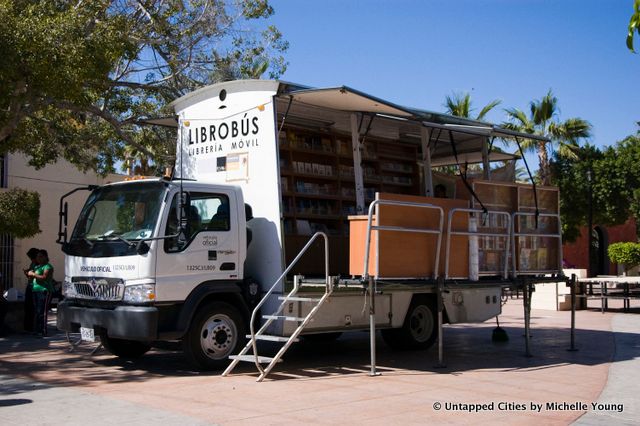How to Make a Subway Map with John Tauranac
Hear from an author and map designer who has been creating maps of the NYC subway, officially and unofficially, for over forty years!


Trucks selling food are no stranger to city streets. But a truck selling books? In the age of iPads and tablets, books have to keep up somehow. One way they’ve done so is through micro-libraries and book exchanges. Another is a growing number of unconventional mobile libraries, transported via trucks, carts and even boats. Using food trucks and bookmobiles as inspirations, the US division of London-based Penguin Group recently launched the Penguin Book Truck and Pushcart. After debuting at Book Expo America at Javits Center this past May, the truck is hitting the road this summer and fall for book festivals, events and signings.
The 27-foot-long bright orange truck has sides that open to reveal 96 feet of shelving inside. It’s also equipped with LED lights, awnings, café tables and chairs for readers. The pushcart, inspired by New York’s hot dog carts, will travel with the truck. It’s currently appearing at showings of Shakespeare in the Park in Central Park. In October, the truck will hit Route 66 to recreate the Oklahoma-California journey of John Steinbeck’s Joad family in The Grapes of Wrath.
The truck is meant as a new way to “bring writers to readers.” It seems “new ways” means reinventing old ways, as bookmobiles have been in existence for centuries, first as horse-drawn wagons and then as delivery vans.
Penguin’s truck follows Mexico City’s Librobus, a traveling library on a social mission. The bus was started in 2012 by nonprofit Alumnos47 with the goal of increasing public appreciation for contemporary art. The truck’s 215-square-foot space holds 1,500 books on culture and visual art. Librobus takes a modern spin on the tradition of using mobile libraries to spur education programs in Mexico’s rural communities. At each of its stops, the truck hosts workshops and talks for the local audience.
For those that eschew the roads, there’s another means of travel. London’s Word on the Water is a floating “bookbarge” that travels up and down the city’s canals. Since 2011, the secondhand shop has offered an eclectic mix of books and hosts readings, live music and poetry slams. The barge moves every couple of weeks, and its mobility allows it to reach a wider audience. (It keeps followers informed of its next destination via Twitter).
From these spins on traditional bookmobiles, it seems a return to the past is necessary to adapt to the changing landscape of reading. It’s comforting though, to think that books satisfy a certain craving–a desire to squirrel away on a rocking boat or lounge at a sunny mobile café for an afternoon–that Kindles and Nooks can’t.
Get in touch with the author @catku.
Subscribe to our newsletter